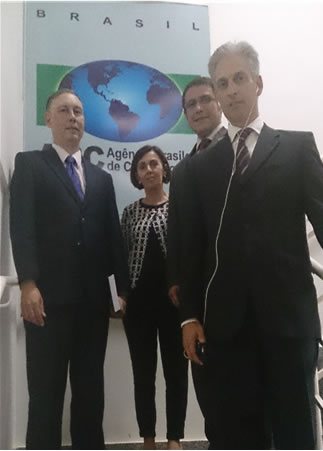Pierre Horna, Officer-in-charge of COMPAL-UNCTAD and Fernando Furlan, GAE member of COMPAL II met with Mr. Marcio Lopes Correa and Cecilia Malaguti do Prado to discuss future issues of cooperation between UNCTAD and Brazil.
At the request of UNCTAD and with the support of the Brazilian Competition Agency (CADE), Mr. Márcio Lopes Correa, General Coordinator of Multilateral Cooperation of the Brazilian Cooperation Agency and Mrs. Cecília Malaguti do Prado, Manager of Trilateral Cooperation, received UNCTAD official and Advisor in Brasilia on 27 May 2014.
The purpose of the meeting was to exchange views and information about UNCTAD programmes on south-south cooperation in Competition and Consumer policies in Latin America and elsewhere and determine whether the work of ABC could complement the work of UNCTAD in these areas.
UNCTAD structured its presentation around the following topics:
Presentation of COMPAL GLOBAL as part of UNCTAD wider work on trade and development for developing countries and CIS
How COMPAL Latin America should be replicated to the other regions of the world
How COMPAL GLOBAL will liaise with BRICS work on Competition and Consumer Protection issues.
ABC informed UNCTAD about how ABC operates around the world and what they are their priority countries. An aspect mentioned is that ABC has no previous collaboration experience with UNCTAD, although they are quite active with UNDP.
 From left to right: Márcio Lopes Correa, Cecilia Malaguti do Prado, Pierre Horna and Fernando Furlan |
Following the presentation of COMPAL GLOBAL; ABC kindly requested UNCTAD to share the two evaluations carried out to COMPAL I and II in 2007 and 2012 respectively. UNCTAD stressed the importance to establish an institutional agreement and other forms of understanding with ABC in order to avoid duplicity of efforts and to create synergies. ABC also informed that there is a need for both axes: a total engagement of the Competition and Consumer Protection Authorities of Brazil (CADE and SENACOM, respectively) and, requests for TA from potential beneficiary countries. To this end, UNCTAD added that we are ready to implement a plug-in approach in order to strengthen COMPAL Latin America (regional one) when both Brazilian authorities are more engaged with UNCTAD. The meeting finished by agreeing that UNCTAD should send more information about COMPAL GLOBAL and ABC will reply by sending their strategy for the next 4 years. A videoconference meeting should be organised to follow-up this cooperation in due course.
ABC is affiliated to the Ministry of External Relations (MRE) and is the agency of the Brazilian Federal Government in charge of all international technical cooperation involving Brazil and other countries or international organisms. ABC has the mandate to negotiate, coordinate, implement and monitor technical cooperation projects and programs that stem from agreements signed between Brazil and other countries and international organisms. In addition, ABC provides guidance to other Brazilian agencies regarding cooperation opportunities involving Brazil, supporting the preparation of projects, coordinating negotiations between cooperating and beneficiary parties, monitoring and evaluating project implementation and publicizing information on project development and achieved results. ABC also plays a significant political role in the Brazilian diplomacy as the agent of the country's technical cooperation with an increasing number of developing countries, contributing to disseminating a modern image of Brazil and its institutions and consolidating the country's leading role at both regional and international levels. Sustainable economic growth, political stability and effective public policies have made it possible for Brazil to reduce regional and social inequality, establishing a platform for a more proactive international role based on sharing successful development experiences and knowledge. Brazil's more assertive action in the international scenario is a result of learning acquired in many years of received technical cooperation, which helped consolidate model entities that have become the very base of the Brazilian technical cooperation with other developing nations. Other comparative advantages include geographical location, cultural heritage, and social and economic challenges common to those of beneficiary countries - factors that have favoured the expansion of Brazil's South-South cooperation.


